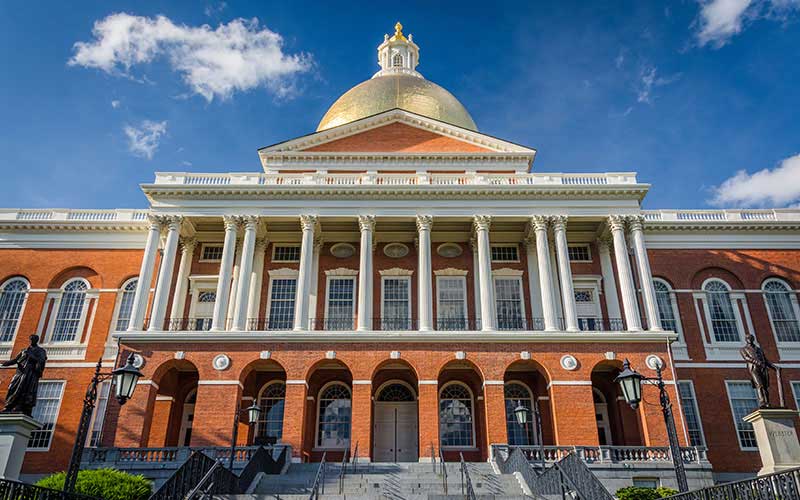
Massachusetts has a chance to update its Global Warming Solutions Act. Photo Credit: Jon Bilous via Shutterstock
This post was co-written by Alyssa Rayman-Read, Vice President and Director of CLF Massachusetts, and Joan Meschino, state representative for the Third Plymouth District and lead sponsor of the 2050 Roadmap Bill. It originally appeared in Commonwealth.
Living on the Massachusetts coastline means we both get a front-row seat to some of the most dramatic impacts of climate change. We can see what rising seas and pounding storms are doing to our beaches, businesses, and storied seaside communities. However, the effects of the climate crisis will not only be felt on the coast. Whether you live in Worcester, the Pioneer Valley, or on Cape Cod, none of us is immune to the public health, economic, and environmental impacts. The science is clear: Climate change threatens everything we know and depend on. And we have a responsibility to act now.
Massachusetts has been a leader in the fight against climate change. Yet, several alarming reports by top climate scientists have made it clear that this fight is just beginning. If we are serious about safeguarding the character and nature of our communities, we must take action now. We need a bold commitment to addressing the climate crisis that includes concrete steps for reaching net-zero carbon emissions while promoting a just transition to a clean energy economy.
That is why 59 legislators in the Massachusetts House and Senate, on both sides of the aisle, have signed onto the 2050 Roadmap Bill (H.3983). Developed with input from a diverse group of stakeholders, including labor and business leaders, local officials, environmentalists, and our utilities, the 2050 Roadmap Bill is a bold response to the crisis currently at our doorstep. The bill gives us a plan for steadily reducing our carbon pollution, while ensuring that the opportunities and benefits of a cleaner, healthier, more just economy are enjoyed by everyone in Massachusetts.
Achieving carbon neutrality and a just transition by 2050 seems a daunting challenge. Still, it is one that we are confident that we can accomplish by updating and strengthening our existing legislative framework for climate action — the landmark Global Warming Solutions Act of 2008. Since it was implemented a decade ago, the GWSA has helped to drive our emissions down and our economy up, with the addition of more than 100,000 clean energy jobs in Massachusetts and over $13 billion annually to our economy.
The 2050 Roadmap Bill will ensure that these nation-leading successes continue as we work to achieve net-zero greenhouse gas emissions. How will this happen? By combining the best-available science with a healthy measure of common sense. Like any business or family building for the future, the Commonwealth’s long-term climate goals will be best achieved by making a plan and then sticking to it. As its name signals, this wisdom lies at the heart of the 2050 Roadmap Bill.
After re-calibrating our Global Warming Solutions Act goal to net-zero, the 2050 Roadmap Bill directs our state agencies to accelerate, broaden, and integrate their efforts to combat climate change, so that the Commonwealth will have a new, comprehensive strategy in place in record time. Shortly thereafter, the 2050 Roadmap Bill requires that the Commonwealth create new programs and regulations – whatever is needed to implement the plan. And not just once. The bill requires that we keep at it, updating our research, planning, and framework for action every three years so we can learn from our experience and continue to take advantage of new technologies, markets, and opportunities.
As we accelerate these efforts, however, we need to ensure that we are moving forward together, building a new, clean energy economy that benefits us all. That is why the 2050 Roadmap Bill will, for the first time, place people-centered protections at the heart of our climate efforts. By requiring that the new plan and policies be designed to assess and minimize whenever possible any adverse economic, environmental, or public health impacts, this new legislation will ensure that low- and moderate-income people and those living in environmental justice neighborhoods thrive as we decarbonize.
We do not need another study to tell us that the impacts of climate change are here. Storms are growing more intense each year, and we continue to break heat records every summer. We must reach net-zero emissions in the coming decades to ensure these conditions do not get worse, and the 2050 Roadmap Bill provides the plan to get us there.
Massachusetts has an opportunity to forge a new path forward and lead the nation in building a prosperous, carbon-neutral economy. If we want to avoid the worst of the climate crisis, we must get to work immediately to protect our environment, facilitate a just transition to a clean and growing economy, and transform our way of life.



